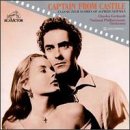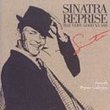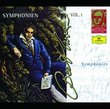| All Artists: Alfred Newman, Charles Gerhardt, National Philharmonic Orchestra Title: Captain from Castile: Music from Alfred Newman Film Scores Members Wishing: 0 Total Copies: 0 Label: RCA Release Date: 7/1/1991 Genres: Pop, Soundtracks Style: Easy Listening Number of Discs: 1 SwapaCD Credits: 1 UPCs: 078635018424, 078635018448 |
Search - Alfred Newman, Charles Gerhardt, National Philharmonic Orchestra :: Captain from Castile: Music from Alfred Newman Film Scores
 | Alfred Newman, Charles Gerhardt, National Philharmonic Orchestra Captain from Castile: Music from Alfred Newman Film Scores Genres: Pop, Soundtracks
|
Larger Image |
CD DetailsSimilarly Requested CDs
|
CD ReviewsWonderful first approach to Alfred Newman's music. Juan Alberto Diaz Wiechers | Santiago Chile | 11/22/2001 (5 out of 5 stars) "The joint work of producer George Korngold and conductor Charles Gerhard, together with the National Philharmonic Orchestra, during the early Seventies, produced several wonderful recordings of the most important film scores from the great age of Hollywood. These recordings rose to CLASSICAL level the work of cinema composers. They were the first serious attempt to elevate to its due place some of the best works of symphonic music of the Twentieth Century. In the case of this recording, it included, unfortunately in only 44 minutes (other 6 to 8 minutes might have been added), the best of Alfred Newman's creative life. The orchestra was magnificent, the sound wonderful, and the conductor achieved a very high level. For over 25 years this recording was the most accurate expression of the best of Alfred Newman. The recording of "Captain from Castile" was outstanding, with the love theme and the famous march "Conquest". Now it is possible to find several other recordings to include in a collection of Alfred Newman's music, but this one must be the first one. It is the best recording of all. Other recordings (not including original Soundtracks) which I can recomend are: 1) The symphonic suite of "Captain from Castile", especially assembled by the composer and recorded in 1947 with the 20th Century Fox Orchestra. It is magnificent. I have already commented said work. 2) The recording of Koch "Wuthering Heights, a Tribute to Alfred Newman", with suites from many of Newman's scores. 3) The recording of MARCOPOLO "The Huntchback of Notre Dame". Also are recomended other recordings of this same label, which include works by Newman. 4) The recording of Silva America "The Man from Galilee", in two CDs, which includes suites from other scores not previously released, and a Cantata based on Newman's music for "The Robe" and "The Greatest Story ever Told"." Two of my favorites - Newman and Gerhardt Stuart M. Paine | Arlington, VA USA | 10/18/2008 (5 out of 5 stars) "The music of Alfred Newman has held a special place in my heart since 1962 when at the age of nine I exited a theater stirred by several of the melodies I'd heard in HOW THE WEST WAS WON. A decade later, THE ROBE would be one of my first two soundtrack albums and THE GREATEST STORY EVER TOLD, upon its rerelease in 1971 or 72, the first film I ever paid to see specifically to hear the music. Gerhardt's sound does it for me, too. It's big and splashy, passionate and indulgent and at times just a little rough around the edges, but that's OK. He's not neurotically fussy over every detail; he sees the trees but loves the forest. His National Philharmonic Orchestra plays both tenderly and exuberantly and really captures Newman's spirit. Their sound is so lush and has such presence you can almost wrap your hands around it and squeeze. My favorites are the heavenly "Cathy's Theme" from WUTHERING HEIGHTS, the 7:57 suite from SONG OF BERNADETTE, "London Calling" from THE BEST OF EVERYTHING and the disc's finale, the 8:42 suite from THE ROBE. The suite from CAPTAIN FROM CASTILE begins ethereally, like Debussy's "Iberia", and shifts into an exhilarating march. Another reviewer complains of awkwardly uneven tempi at the finish. I do see what he means, but still the performance convinces me. It's just a different vision. Pointedly altering a tempo (Stokowski, Bernstein) CAN work. What I don't see are his complaints concerning "Caligula's March" and "The Map of Jerusalem" from THE ROBE; I just don't hear anything wrong with either of them. The final impassioned choral statement of "Diana's Theme" in "Map of Jerusalem" nearly bursts at the seams. Wonderful. I know of no two orchestras, conductors, soloists or anyone else who have ever been precisely the same and I like that Newman's and Gerhardt's approaches and results differed. This is classy stuff. I think that for most listeners this would be a rewarding place to start with this composer." A Dud Music Lover in the Canyon | Silverado, CA | 10/10/2008 (2 out of 5 stars) "Even though RCA's series of recordings dedicated to Golden Age film composers was, by and large, well-received by critics, film afficianados, and music lovers, this compilation of Alfred Newman's most popular scores unfortunately did not and still does not meet the standards set by the others. Some of the blame must be placed with the sound quality, muffled and congested, a problem first heard in the vinyl release but made even worse by these dull Dolby-ized digital remasterings. Just listen to the Fox fanfare at the outset, and you can hear how the highs are missing; listen further to the March from the Castille score or the Prelude to The Robe, and you'll probably not want to listen anymore.
In addition to the poor sound, which admittedly some listeners can adjust to, there are the leaden, even lumpy performances. Conductor Charles Gerhardt had shown some skill with the film genre in the other releases in the series, especially the Korngold and Hermann discs, but here he seems out of sympathy, even incompetent. If you compare any of Newman's ancient recordings of his own music with the 20th Century Fox studio orchestra or any Hollywood pick-up band he recorded with, you can hear the difference between a great conductor, someone with control over rhythm, phrasing, balance, and overall sound, and someone like Gerhardt who awkwardly stumbles through the scores as if he were approaching them for the first time. Listen to the ridiculous gear-shifting in the aforementioned March, or the confusion due to poor balance and lack of rhythmic control in the other famous march in The Robe, or to the incoherence at the end of The Map of Jerusalem, compare these same great moments in film music to Newman's own performances, and you can hear immediately the latter's superiority in concept and execution. I'd pass on this one if I were interested in Newman's music. The original soundtracks, available from various sources, in honest low-fi sound, but conducted by the composer, are definitely to be preferred." |

 Track Listings (10) - Disc #1
Track Listings (10) - Disc #1








